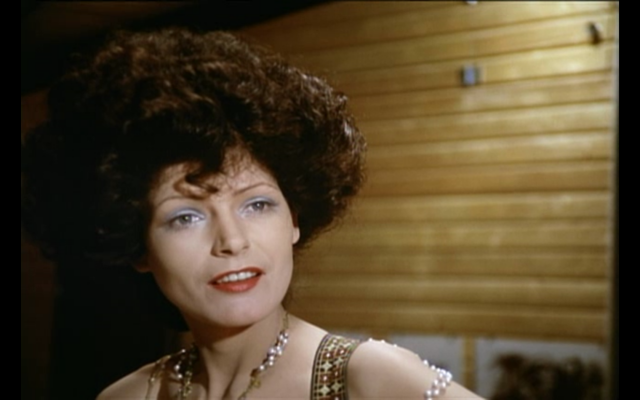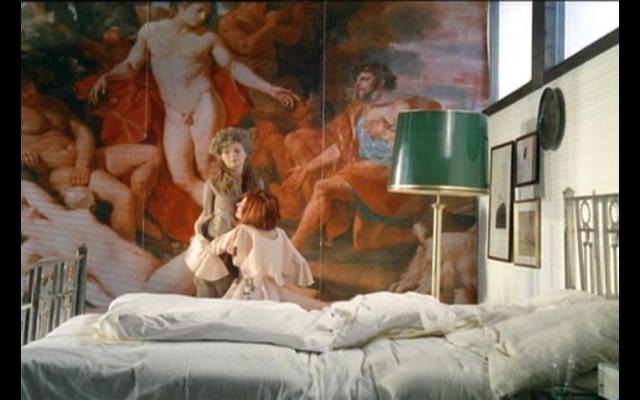Bitter Tears of Petra von Kant, The (1973)
“Discipline’s okay as long as you’re having fun.”
|
Synopsis: |
|
Genres, Themes, Actors, and Directors:
Review: Based upon Fassbinder’s own play, Bitter Tears very much retains its theatrical origins: it’s neatly divided into “acts”, and all takes place within the strategically claustrophobic quarters of Petra’s apartment. This works just fine throughout the first “act”, when viewers are sure to be intrigued (if nothing else) by the direction Fassbinder is taking us in. But by the time the story’s central thesis is finally established — that Petra’s obsession with “owning” Karin will be her undoing — we’ve become a little weary of the film’s slow pacing and patently artificial staging. Fassbinder constructs his film as an elaborate homage to Douglas Sirk’s colorful mid-century melodramas, with a decidedly perverse bent: his lead characters (all female) inhabit a world of outlandishly baroque outfits (complete with wigs and garish make-up) and surreal sets populated by strategically framed female mannequins and an over-sized reproduction of Nicolas Poussin’s 1629 painting “Midas and Bacchus” dominating one of the walls of Petra’s home. It’s all visually arresting, but eventually not compelling enough to keep us invested in watching “poor” Petra’s downward spiral. With that said, Bitter Tears is the kind of dense, wordy film that lends itself to academic deconstruction — so if you’re up for this type of intellectual challenge, definitely check it Jonathan Rosenbaum’s critical essay. Redeeming Qualities and Moments: Must See? (Listed in 1001 Movies You Must See Before You Die) Links: |



2 thoughts on “Bitter Tears of Petra von Kant, The (1973)”
Not a must – and a very annoying film.
When I moved to NYC in the late 70s, Fassbinder was fast becoming the cinematic flavor of the year. His films were constantly shown in revival houses, often as double-bills – and, at the rate of speed with which he worked, he had a new film out before you knew it.
He was fascinating to discover, difficult to absorb. Naturally there was personal interest cause here was a gay sensibility at work. (‘Facts’ to the contrary, I don’t see much evidence that Fassbinder was believably bisexual.) I was younger then, so it was easier to handle the domino effect of his films.
In retrospect…it’s easier to recognize the director’s better work. ‘Bitter Tears’ is not part of that – for more reasons than I can (really care to) go on about. It’s ultimately just a nasty piece, with very little to recommend it.
It’s basically about a…’woman’…who can dish it out but can’t take it. It’s also (very possibly) about a basically heterosexual…’woman’…who has her first (volcanic) brush with bisexuality and is ill-equipped to handle it. (If you read up on Fassbinder, you’ll be able to draw your own logical sketch of a conclusion about how autobiographical this film is.) I can also suggest that ‘BT’ may also be a film that doesn’t know what the f**k it’s about.
A subject still rarely illuminated on-screen, bisexuality will always have a film doing double-duty, as it were. The exploration of it in ‘BT’ is, unfortunately, somewhat superficial – much like the film itself.
The film is at its best in the first half-hour. Here, at least, Petra is fairly coherent about what led to her recent divorce and that makes for rather solid understanding of how sudden fame can make a relationship implode. (One might also note that the film’s first half is also filmed better, more fluidly – by ace DP Michael Ballhaus. As ‘BT’ progresses, however, it seems there’s very little even Ballhaus can do to salvage it.)
There’s no relief from angst here – not a bad thing in itself…if a film has more (or anything of solid substance) to say. To me, ‘BT’ just seems to flounder for the most part – and then it ends.
I was going to add that I don’t think I’ve ever, in general, found any real humor in any Fassbinder (that I can recall). But then I remembered that the second time I saw this film (if I’m remembering right), I saw it with Tom on VHS. And we laughed ourselves silly, with our own private MST3K session. (As the film reaches its shrill conclusion, it does actually get that bad.)
NOTE: It’s true that this is the type of film that academics could expound on ad nauseum (particularly interesting term in this case). It’s vague to such an extent that, legitimately or not, subtext can be dragged out from any number of places. For example, the mural that dominates the set. Someone could probably write extensively about why that particular painting *might* be there. Myself, I think Fassbinder put it there cause there’s a penis smack in the center.
What I didn’t mention in my review above is that I was struggling mightily to stay awake during the final third of the film, which is definitely when things become “nastiest”, as you say (and ultimately least interesting).
And yet… I continue to be fascinated by Fassbinder and his oeuvre. I’ve seen a handful of his films but certainly not all (and there are quite a few listed in Peary’s book — 16, to be exact). Fortunately, this one hasn’t put me off of wanting to continue to explore his output. I’ll be posting on Veronika Voss — which I really liked — soon.
Interestingly, this title is one of only four Fassbinder films listed in 1,001 Movies You Must See Before You Die — which further validates my opinion of that book as overly academic and ultimately much less reliable in its selections. (I reference it as applicable in my reviews simply as an fyi to readers.)
If you check out the Rosenbaum review, btw, you’ll notice that he cites an academic paper written all about… that dominating painting (!).
And a final thought: I DO find the “subplot” of Petra’s relationship with her assistant (Hermann) one of the most intriguing and frustratingly underdeveloped aspects of the film. If Fassbinder had given this relationship more space (rather than hyper-focusing on Petra’s despair at Schygulla’s leaving), I think the arc of the storyline might have stood a better chance. Hermann is given the final “say” in the movie’s last shot; why not more than this?